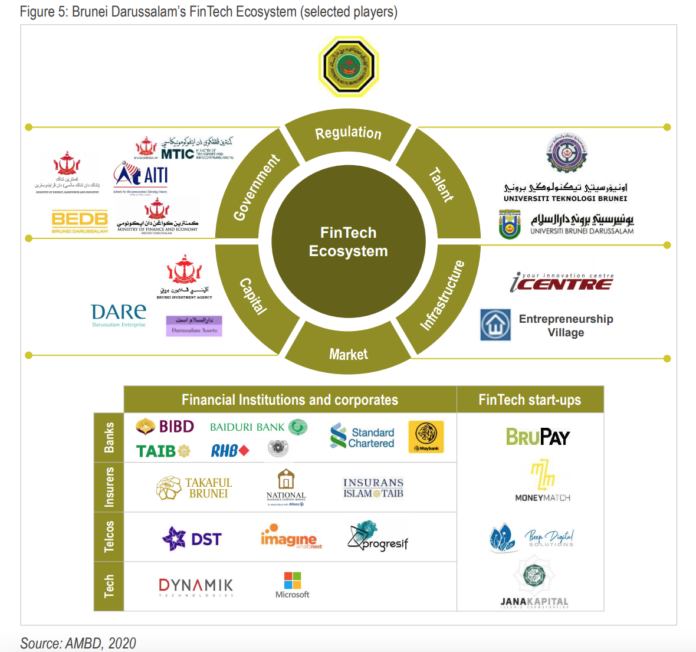Though still in its early stages, Brunei Darussalam’s fintech ecosystem is developing quickly on the back of rising demand for low-cost fintech products, increasing number of entrepreneurs and startups, and supportive government initiatives, according to a new report by the Monetary Authority of Brunei Darussalam (AMBD).
In a report titled The State of Fintech in Brunei Darussalam: Year 2020, the central bank provides an overview of the state of fintech in the Southeast Asian country, outlining the major fintech developments that have occurred over the past couple of years.
In particular, the paper cites the numerous market drivers that are setting a favorable environment for fintech to thrive. These include rising demand from banks for fintech services in customer acquisition as well as loan dispersion, as well as the relatively low level of loans being granted, which indicates potential unmet consumer demand for credit.
In addition to that, the high ratio of foreign workers in Brunei, among the highest in Southeast Asia at approximately 100,000 foreign workers accounting to about 23% of the total population, provides a potential market opportunity for low-cost, digital remittance solutions.
Payments and money transfers are another area that’s poised for disruption, the paper says, noting that currently, interbank transfers in Brunei are amongst the most expensive within ASEAN, indicating an opportunity for cheaper alternatives.
Rising demand for cheaper, more efficient digital financial solutions in Brunei has led to the emergence of several new fintech solutions.
So far, most of the financial innovations in Brunei have been initiated by banks themselves through initiatives like QuickPay, a digital payment solution by Bank Islam Brunei Darussalam (BIBD), and Progresif PAY, an e-wallet service developed by Progresif Cellular through a partnership with BIBD.
But in recent years, a handful of independent startups have entered the market with solutions addressing funding gaps and rising demand for digital payment and remittance services.
BruPay, for example, is an inclusive mobile wallet that integrates several financial institutions. Beep leverages its cloud-based fintech platform to allow local merchants to accept AliPay payments from Chinese nationals in Brunei, including tourists and expatriates. MoneyMatch is a remittance startup that provides fully digital services with electronic know-your-customer (eKYC), and a hybrid currency settlement and disbursement portal. And Jana Kapital is a peer-to-peer (P2P) Islamic crowdfunding platform.
These four startups are currently taking part in the AMDB Fintech Regulatory Sandbox and are undergoing the assessment and evaluation process towards obtaining the required approvals for participation in the market.
The Fintech Regulatory Sandbox allows participants to test and experiment with their fintech solutions. It also serves as a repository of information and acts as a gateway for the submission of queries and for obtaining feedback from parties in the ecosystem.
Brunei Darussalam’s Fintech Ecosystem (selected players), Source: AMBD, 2020, The State of Fintech in Brunei Darussalam
Government initiatives driving fintech development
The regulatory sandbox is just one of the numerous initiatives that Brunei government has introduced to help foster fintech innovation.
The central bank has also set up the Fintech Office, a virtual facilitation office run and operated by AMBD’s Fintech Unit. The Fintech Office serves as a one-stop virtual facilitation office where interested parties may contact AMBD on any matters concerning fintech-related matters.
In 2019, the Digital Economy Council (DEC) was established to guide policy formulation and coordinate efforts of government bodies towards Brunei’s drive to become a Smart Nation. DEC’s top priorities include making the society cashless by embracing digital payments, digitalizing government services and initiating export-driven initiatives supported by growing talent.
Brunei has also established a bilateral fintech cooperation with Singapore to facilitate the sharing of information on emerging fintech trends and promote joint innovation projects between the two countries. AMBD is currently working on other bilateral partnership opportunities, the report says.
Additionally, initiatives such as the national digital identity (e-Darussalam Account) have allowed fintech companies to leverage digital capabilities provided by the government to create innovative and convenient digital financial services.





